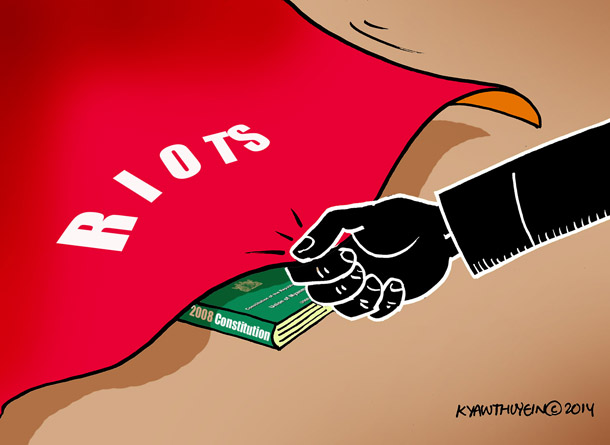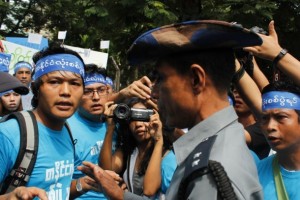Posts Tagged ‘Riot’ (6 found)
Burma Must Find a Path to a More Tolerant Society
 The streets of Mandalay, which just recently drew over 20,000 people in support of National League for Democracy and 88 Generation Peace and Open Society’s joint campaign to amend Section 436 of the Constitution in support of democratic reform, remain deserted this last week as many business owners closed their shutters in fear, following serious unrest in the city. In the second largest city in Burma, violent mobs took over the streets, leaving two people dead and dozens injured. Some stated that over “70 police were here but did nothing,” as Buddhist mobs torched a school in a Muslim area. Ironically the international community has mostly stayed silent in the wake of the recent events when their actions are needed to protect the people of Burma, especially the most vulnerable communities, more than ever.
The streets of Mandalay, which just recently drew over 20,000 people in support of National League for Democracy and 88 Generation Peace and Open Society’s joint campaign to amend Section 436 of the Constitution in support of democratic reform, remain deserted this last week as many business owners closed their shutters in fear, following serious unrest in the city. In the second largest city in Burma, violent mobs took over the streets, leaving two people dead and dozens injured. Some stated that over “70 police were here but did nothing,” as Buddhist mobs torched a school in a Muslim area. Ironically the international community has mostly stayed silent in the wake of the recent events when their actions are needed to protect the people of Burma, especially the most vulnerable communities, more than ever.
The series of events began on 1 July, just hours after the extremist Buddhist monk, and leader of the anti-Muslim 969 movement, Wirathu, picked up a questionable post from the social media site Facebook that highlighted an alleged rape of a Buddhist woman committed by two Muslim brothers. According to David Mathieson, a senior researcher for Human Rights Watch, Wirathu, who is based in Mandalay, appeared to have played “a pivotal role” in inciting the unrest, fanning tensions by spreading accusations with religious inferences, while calling for action against the two Muslim brothers who own a teashop in the same area where his monastery is located […]
• • •Keep Human Rights on the Agenda for Burma
 This week Tomás Ojea Quintana, the Special Rapporteur on the situation of human rights in Burma, presented his latest report to the United Nations General Assembly (UNGA) that will adopt, in a few weeks, its annual resolution on the situation of human rights in the country.
This week Tomás Ojea Quintana, the Special Rapporteur on the situation of human rights in Burma, presented his latest report to the United Nations General Assembly (UNGA) that will adopt, in a few weeks, its annual resolution on the situation of human rights in the country.
Since the lifting of sanctions and the renewal of diplomatic ties with the Burma government by many foreign countries, the UNGA resolution is one of the last tools remaining in the hands of the international community to encourage the government to turn the preliminary changes of the last year into more concrete democratic reforms.
Despite recent developments in Burma, the root causes of armed conflict still haven’t been addressed and human rights violations are ongoing, serious and prevalent throughout the country.
This week, the violence in Arakan State errupted again with more than a hundred victims in a week. Meanwhile, fighting in Kachin State continues and Mr. Quintana said in his press statement, “I have received allegations of attacks against civilian populations, extrajudicial killings, sexual violence, internal displacement, torture, forced labour and portering, as well as the ongoing use of landmines and the recruitment of child soldiers, by all parties to the conflict.” […]
• • •Burma and Bangladesh Must Answer Cries for Help
Sectarian violence that erupted a week ago in Arakan State has continued over the last week leading to the displacement of over 30, 000 people in need of shelter, medical assistance and food. In light of the serious humanitarian crisis that faces Rakhine and Rohingya people, international and Bangkok based human rights activists released a statement calling for the international community, including diplomatic missions in Burma and the United Nations, to send independent monitors to assess the situation and take appropriate steps to address any worsening of the situation.
The Asian Human Rights Commission also sent an open letter to Burma and Bangladesh calling on both governments to take a cooperative and humanitarian approach to the violence and to enable the provision of adequate food and health services to the affected populations.
However, despite Vijay Nambiar, the UN’s special envoy, visit to Arakan State, no humanitarian supplies have reached the victims of the violence and Bangladesh has been turning away people fleeing Arakan State, announcing that it will not allow any refugees from Burma on its territory […]
• • •ရခိုင္ျပည္နယ္တြင္ ျဖစ္ေပၚေနသည့္ အၾကမ္းဖက္သတ္ျဖတ္မႈမ်ား ရပ္တန္႔ရန္ႏွင့္ တရားဥပေဒအရ အျပည့္အ၀ ကာကြယ္ေစာင့္ေရွာက္ေပးရန္ တိုက္တြန္းေတာင္းဆိုျခင္း
ရခိုင္ျပည္နယ္ ေနရာတခ်ဳိ႕တြင္ လက္တေလာ ျဖစ္ပြားေနသည့္ အၾကမ္းဖက္ တိုက္ခိုက္မႈမ်ားေၾကာင့္ အခင္းျဖစ္ပြားရာေနရာရွိ အျပစ္မဲ့ျပည္သူမ်ားစြာမွာ ေၾကာက္ရြံ႕စိုးရိမ္ဖြယ္ရာ အသက္ေဘးအႏၱရာယ္ဆိုးမ်ားႏွင့္ ၾကံဳေတြ႕ေနၾကရသည္။ အၾကမ္းဖက္ တိုက္ခိုက္မႈမ်ားမွာ ယခုအခ်ိန္ထိ […]
• • •Burma: Critical Questions About Communal Violence
The Asian Human Rights Commission shares the worldwide concern about the communal violence in Arakan (Rakhine) State in Burma over the last fortnight, which has received widespread reportage in the international media, and joins in calls for its earliest cessation […]
• • •Tensions Between Ethnic and Religious Minorities Threaten Myanmar’s Democratic Transition
The United Nations Special Rapporteur on the human rights situation in Myanmar, Tomás Ojea Quintana, warned today that the escalating violence in the Rakhine state, that has been triggered by conflicts between Buddhist and Muslim communities, represents […]
• • •








 All posts
All posts